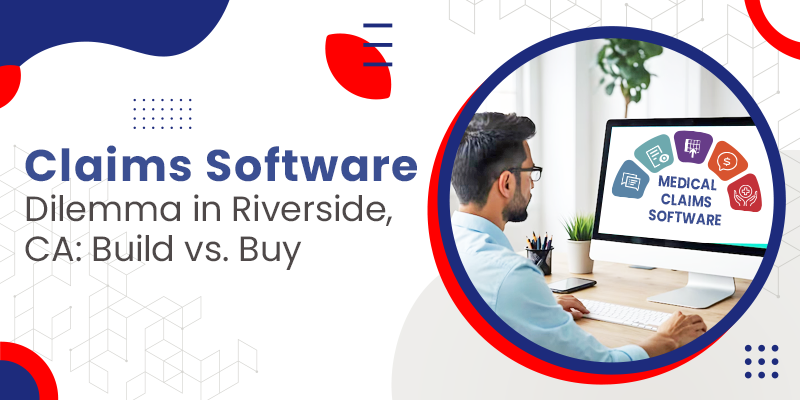Claims Software Systems: The Future of Smart Claims Handling
April 23, 2025
With increasing uncertainty in life, more and more people are investing in good insurance. By looking at this trend it’s safer to say it’s a very lucrative business to be in the present and coming years. Is it that simple for business?
In today’s fast-moving world, insurance companies and risk management businesses need efficient claims software to stay competitive and meet rising customer expectations. Every insurer faces a key decision: build their own claims managing system or buy a ready-made solution.
Both options come with their pros and cons, so understanding these trade-offs is important for making the right choice. And if you are a business in Riverside, CA struggling with this question, this write is for you! By the end of this blog, you will know what to choose.
Let’s first explore the challenges of building your own claims software versus the benefits of buying an existing claims management system.
Building Your Own Claims Software-Challenges
At first, building a custom claims management system may seem appealing. Something of our own, we know the feeling! Having software tailored to your unique processes and operations sounds like the perfect fit. You are not the only one caught up in this emotion, there are many before you! But, many insurers eventually discover that the reality is far more complex than expected. Here are the major challenges of building a claims management system in-house:
- Technical Complexity
Building robust and secure software is no easy task. You need to know technical know-how to build actual working software. It has been seen that insurance companies often lack the in-house expertise required to develop and maintain complex software.
Even with an internal IT team, getting management support and aligning tech decisions with insurance needs still can be challenging tasks for them. As a result, insurers may end up with software that is unstable, clunky, or poorly integrated with other tools.
- Cost Overruns and Resource Allocation
This is our age-old wisdom building: “Something from zero takes time and patience”. Building a system from scratch takes a lot of time, money, and people. Companies need to define every feature, hire developers, and constantly engage management for approvals. This can delay the project, causing budgets to exceed and timelines to stretch beyond what was initially planned.
Furthermore, if the project takes too long or doesn’t perform well, insurers may end up spending more on fixes and improvements. Overall more trouble and loss to the business. Often, companies find themselves stuck with a failed system because of the sunk costs already invested. And sadly some of those businesses will never be able to make it to market.
- Maintenance and Upgrades
The job doesn’t end once the software is developed—it requires constant maintenance and updates. Insurance regulations, market demands, and security standards are always evolving, and an in-house team must keep the system up to date. Maintaining legacy systems can become time-consuming and expensive, leaving insurers with fewer resources to focus on their core business.
- Falling Behind the Competition
Competitors who use advanced cloud-based claims management systems often have an edge. These systems allow faster claims handling, better customer service, and smoother operations. Insurers that stick with outdated, in-house systems may struggle to keep up with changing market trends and customer expectations, putting their business at risk.
Buying Claims Processing Software
Many insurers are now turning to ready-made claims management platforms to streamline their operations. These platforms offer several benefits, including easy implementation, scalability, and continuous updates. Below are the key advantages of buying a claims processing system:
- Focus on Your Core Business
When you opt for an existing claims software solution, your team can focus on selling policies, managing risks, and providing excellent customer service. With a cloud-based platform managing the technical details, your claims adjusters can focus on making decisions. This allows them to enhance the customer experience instead of dealing with software issues.
- Reliable and Scalable Systems
Pre-built claims processing software is tested and proven to perform across a variety of customer needs and industries. These platforms are scalable and secure, ensuring smooth operations as your business grows. With these features whenever you decide to expand your business all you need is to update. You do not need to change the whole operation or worse, buy a new system. They are also built with modern technologies, such as automation and artificial intelligence, to improve operational efficiency.
- Adaptability to Changing Needs & Trends
Some insurers worry that ready-made software won’t fit their specific workflows. But, they are not aware that we are in the era of customization. Many platforms offer customizable options that can be tailored to meet your exact requirements. You can customize your own software according to your business model and needs. You can create custom workflows and fields without the need for complex coding, allowing you to quickly adapt to market changes.
Unlike in-house systems that can take months or years to update, modern cloud platforms can be customized and adjusted in just a few days. This helps keep your business agile and responsive.
- Continuous Updates and Maintenance
Like other devices, claim managing software also has frequent updates that need to be integrated on a regular basis. One of the biggest benefits of buying ready-made solutions is the ease of maintenance. These platforms are updated regularly with the latest features, improvements, and security patches, so you’re always using the most current version.
Customs software providers also manage regulatory compliance and security updates. This ensures that your operations are always in line with industry standards. This reduces the burden on your internal team and keeps your claims management future-proof.
Why Buying is Often the Better Option
While building a custom system may seem appealing at first, the time, cost, and effort involved often outweigh the benefits. Many insurers who start with an in-house system eventually realize they’ve made a costly mistake and switch to market-ready solutions.
By opting for tailored claims software, insurers access a reliable, scalable, and adaptable platform. This choice eliminates the headaches of development and maintenance. This allows them to focus on their core business, stay ahead of the competition, and meet customer expectations with ease.
Conclusion
We are at the end of our discussion, and we have seen both sides of the coin. We have tried to balance both sides of the argument in an objective manner. In our final words, we can say that if your goal is to survive and thrive in this cut-throat competition, then a proven claims processing solution is usually a smart choice.
We have already established how Claims Processing Software plays a huge role in delivering fast, efficient, and customer-friendly services. This approach not only frees up resources, ensures smooth operations, and helps insurers stay ahead of evolving customer needs and industry trends.
It provides 360 coverage to your claim management system, covering your primary concern to handling secondary one with one stroke.
How Health Claims Management Software Transforming The Industry?
February 7, 2025How Claims Software Can Transform Your Claims Process?
January 29, 2025The Need For Healthcare Claims Management Software
January 13, 2025Reasons You Should Invest in Claims Management Software
January 7, 2025The Essential Guide To TPA Software Features & Benefits
December 24, 2024Claims Management Software: Key To Streamlining Your Business
December 18, 2024How TPA Software Solutions Transformed Medical Claims Management?
November 20, 2024









